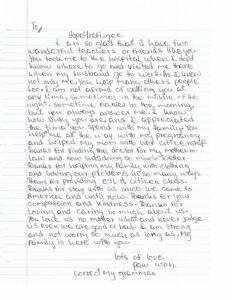Hope 4 Refugees offers holistic ministry
Texas ranked second only to California among all states in terms of refugee resettlement last year, and a Dallas-based ministry wants to provide refugees with hope.
In fact, Texas took in about 8.5 percent of the U.S. total of refugees in 2017. Many settled in Dallas—people from Myanmar, Iran, Africa, Korea, the Middle East and other countries.
Realizing a need to help refugee families, Jeni Knighten and Rebekah “Beka” Petty spent several years in prayer before they started Hope 4 Refugees in the Dallas area. Feeling a call from God, they established the nonprofit organization in 2009.
“Quitting our jobs, we both stepped out on faith and trusted God,” Knighten recalled. “We knew this was what we were supposed to do.”
Hope 4 Refugees receives funding from the Texas Baptist Hunger Offering, and the organization partners with Dallas Baptist Association. It provides educational resources and opportunities to refugees who don’t speak English as their first language. Hope 4 Refugees provides holistic—spiritual, physical, social and mental—assistance to refugee families in the Dallas area after their resettlement period. The organization receives no government grants. Support comes from donations and private foundations.
One-on-one ministry
On a daily basis, Knighten and Petty work one-on-one with refugees.
“Some days, it’s driving a new mother and baby to the doctor, helping a man who has been in a car wreck and doesn’t understand about his insurance, assisting someone who has been incarcerated, and supporting the woman who gave a kidney to her husband,” Petty said.
“We explain ‘how you do things in America.’ Some of these people have lived in refugee camps for 10 or 20 years before coming to this country.”

Many had been farmers in their home countries. To help them become self-sufficient, Hope 4 Refugees allows them to borrow plots of land to raise some of their own vegetables. This has proved successful, and the refugees take pride in their farming skills.
Teaching about citizenship also is part of the Hope 4 Refugees program, and 97 people have become U.S. citizens. Many American laws are new and unfamiliar to the refugees. When people relocate to other cities or communities, they continue to contact the organization when they need advice or don’t understand a situation. At this point, 21 families now are homeowners.
In the Dallas area, some refugees attend churches where their native language is spoken. However, the children learn English in school, and they often want to attend an English-speaking church—often with their parents. So, Hope 4 Refugees works alongside congregations to minister to people whose first language is not English, as well as providing supplemental opportunities for the parents to learn more about Scripture.
‘Lay a spiritual foundation’
“We go to the apartments where refugees live and have Bible study,” Knighten said. “We use the New International Revised Bible because it is easier to understand.
“Their biblical knowledge is limited. We teach how the Old Testament points to Jesus in the New Testament. We teach that Jesus is everything. We can help with their physical needs, but we want to lay a spiritual foundation as well.”
Hope 4 Refugees wants to see lives transformed by Christ. Refugees who become followers of Christ not only influence their immediate families, but also become missionaries to their countrymen—either in the homelands or in the United States.
 She recalled Paw, a woman who called to ask if she and her three children could be baptized. She knew the woman was a believer but uncertain about her children, and she asked if they could visit in her home.
She recalled Paw, a woman who called to ask if she and her three children could be baptized. She knew the woman was a believer but uncertain about her children, and she asked if they could visit in her home.
When she arrived, another woman from a Hope 4 Refugees Bible study, Ma, also was there, because she wanted to know about baptism.
As Paw translated for Ma, it became clear both women had accepted Christ as Savior while they were living in refugee camps in Thailand. However, neither had been baptized because they thought they had to know everything about Christianity and perfectly keep the commandments first.
However, through the Bible study they had attended for two years, they came to realize they never will be perfect, but they are accepted by God because of their trust in Jesus Christ.
Knighten explained baptism is a symbol of the change Jesus makes in a person’s heart and life—an outward expression of inward transformation. So, Paw agreed she needed to talk further with her children, to make sure they had made a personal commitment to Christ and understood the significance of baptism.
“We had such a sweet time of sharing and praying together. They have grown in their faith. It’s times like these that you see the hand of God in the ministry he has given you to do on this earth,” Knighten said.
So far, Knighten and Petty have helped 37 refugees attain high school diplomas. As children grow, Hope 4 Refugees seeks to help them attend college or obtain skills for the workforce. For many of these young people, they will be the first in their family to attend a university or institution of higher education. Most of the parents work in production.
“I tell our refugees that with faith and prayer, anything is possible,” Knighten said.
Carolyn Tomlin writes for the Christian market and teaches the Boot Camp for Christian Writers.